I hope you’ve enjoyed the letters so far. I’m still alive. My time in Guatemala so far has been a little trying- things happen slowly here, and there have been some hangups with my program (more about that in the Technical training section). As promised, I need to catch up on a few topics left over from the previous letter. Like before, you can jump ahead to the parts you care about by clicking on them:
- Host town- San Luis las Carretas
- Host family- los Menchú
- Technical training
- Language training
- Issues in international aid
- Weirdness and more culinary oddities
Also, I want to thank Brian Young for hosting these letters on his server, and helping me with some technical backside stuff, because the internet access here is pretty primeval.
Host Town- San Luis las Carretas
On our fourth day in country, they piled us all onto vans and drove us to our host villages. Four of us went to San Luis las Carretas. I was a bit nervous about it- meeting strange Guatemalans and living in their house for three months… especially without Emily, my translator. Yep, that’s right, my wife is living in a different town than me for the next three months. That’s a little sad, but her town (Pastores) is only about 2km away and we hang out on the weekends and after classes, so it’s kindof like dating again. Living apart from her is REALLY helping my Spanish, though, because I have to do everything for myself. That’s the idea, anyways.
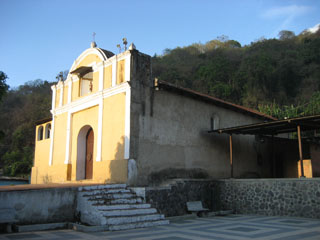
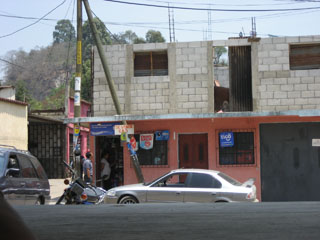
My town is called San Luis las Carretas, and it’s a tiny little burg of about 100 houses clustered in a valley along a road. We have a central plaza and adjoining church (above left), a cantina, a place to buy tortillas, and three “stores”(above right). The stores are about 10×10 feet each, and sell things like soap and candy and soda. The best word I can find to describe this town is “sleepy”. Everyone here knows everyone else (and is likely related), which makes the 4 of us white volunteers that live here stick out like sore thumbs. Within hours of our arrival, everyone in town knew about us. It is impossible to go anywhere without getting stares. This is in part because we’re WHITE, but in part because we’re all about a foot and a half taller than everyone else. It’s like being part rock star, part village idiot.
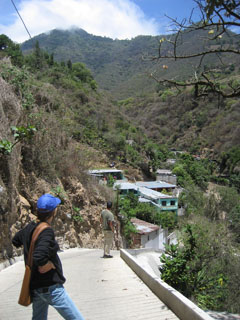
This degree of notoriety has a few advantages, though. Getting lost here is impossible. If we need to know where something is, we can just ask anyone, and they will tell us, in part because they already expect that we will ask. They also warn us of stuff they can foresee going wrong. Examples include, “be sure you’re back by dark, so the bandits don’t get you”, or simply “hey, you’d better move, the bus is about to come barreling through here any second.” Sometimes for language class we have to go find random townspeople and ask them questions. This scared the poop out of me at first, until i realized that EVERYONE here knows who we are, so the opening line of “Hi, I’m a Spanish student, and I’d like to ask you a question…” is largely procedural. They just smile (or giggle, in the case of teenage girls) then put up with whatever dumb thing we have to ask them.
This is the first time that Peace Corps has used this village to host trainees. This means that the four families are new to this, so they are very enthusiastic. Occasionally, overly so. If we return late (after dark) there is a stern chiding about safety. We are given WAY more food than is necessary. When we are sick, they hop around trying to fix it, despite the fact that you just have to wait that stuff out. Also, since it’s a Small Town, as soon anything happens, EVERYONE knows about it. At dinner, I hear about who has the runs and who doesn’t like hocote (a strange local vegetable) and who didn’t go with their family to church. It’s kindof like living in a reality TV show.
Host family- los Menchú
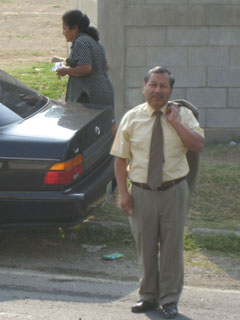 So, what is my host family like? They’re a big, happy, fun family. The “parents” in the house are Jovita and Froilan Menchú. They are about the same age as my real parents, and they have two live-in adult daughters, Anna Louise and Rosa. Anna Luise lives in one half of the house with her husband Guillermo and their three children, Anna Belen (12 yrs), Mémo (8 yrs), and Luz Maria (6 yrs). The other daughter, Rosa, lives in my side of the house with her son Andrés (4 yrs). She just got married to Edgar, and he’s moving in too. I basically had to draw a family tree and write in all the names the first day, because it was nearly impossible to keep track of otherwise.
So, what is my host family like? They’re a big, happy, fun family. The “parents” in the house are Jovita and Froilan Menchú. They are about the same age as my real parents, and they have two live-in adult daughters, Anna Louise and Rosa. Anna Luise lives in one half of the house with her husband Guillermo and their three children, Anna Belen (12 yrs), Mémo (8 yrs), and Luz Maria (6 yrs). The other daughter, Rosa, lives in my side of the house with her son Andrés (4 yrs). She just got married to Edgar, and he’s moving in too. I basically had to draw a family tree and write in all the names the first day, because it was nearly impossible to keep track of otherwise.
Froilan, the father, is a very interesting fellow. He talks slowly and patiently so i can understand, and he likes jokes. I’ve been lucky enough to get him to open up with interesting stories a few late evenings. He survived some pretty scary stuff (including an assasination attempt) while in the army during the War Years, and also founded the regional chapter of Alcoholics Anonymous back in the late 60s. Nowadays he’s the head layperson in the local catholic church, and plays the guitar at the Sunday service. He owns a tailor’s shop in Antigua, the nearest large town.
Jovita is really nice, and tries very hard to cook stuff I will like. I try to be polite, and eat what’s put before me, but she picked up early on that I hate eggs, and they’ve disappeared from the menu (except for Andrés’ plate, he loves them). Last week, she somehow discovered that I have this strange like for COLD milk in my cereal, so that started showing up as well. It’s not even from powder. I am the envy of all the volunteers in the area now; they still get steaming hot powdered milk in their morning cereal bowl.
This is all very much like being a kid again in some ways. The host mothers prepare the meals, we show up and eat them. They do our laundry, and even mop our rooms. If we have to travel to spend the day away in the training center, they pack us little lunches. Since our mothers are “new”, they even walk us to the bus stop and wait with us. It’s hilarious. I will try to get a picture of the cute tiny little Guatemalan grannies waiting in the main plaza.
The four kids are a riot, and like to play football (soccer) with me in the patio/ courtyard of the house. Sometimes I swing them around by their ankles, or tickle them, all behaviors I learned with Emily’s nieces & nephews. They seem to like it; whenever I get home from classes or meetings they scream my name and come running. I guess that’s a good sign. Here’s Guillermo & his family, followed by my buddy Andrés:
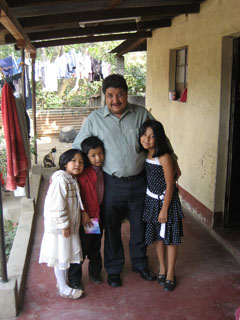
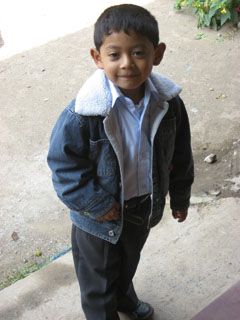
Sleeping here would be a challenge for a light sleeper. The three chuchos (mangy street/guard dogs) occasionally go bonkers in the middle of the night and yelp/fight/howl. The rooster next door goes off at 4am, 5am, AND 6am. When he decides to sleep in, the rooster on the other side covers for him. The neighbor to the south nags her children loudly and incessantly at all hours, and about a block to the north there’s an evangelical church that puts the 4-hour long service over a loudspeaker three times a week, for us all to hear. But none of that really bugs me, because I am so tired at the end of each day it doesn’t even matter.
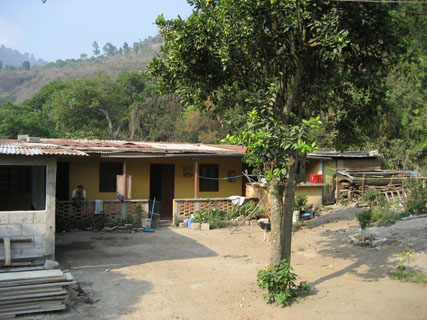
Our house is a block and plaster house with a corrugated tin roof. It makes pleasant sounds when it rains, and it’s hot as hell when it’s sunny. When the cat or chickens run across it in the night time, it sounds like a herd of elephants playing. We have a fair amount of trash in our patio/ yard (that is a recurring theme in Guatemala), but it’s offset by some pretty cool trees. We have avocado, oranges, hocote, limes, and coffee. Other stuff exists here too; for example, Anna’s house has bananas and peaches. I’ve had fresh mango several times so far (yay!) but I think they grow on the coast, at lower altitudes.
I can give you a brief tour of the premises. Here we have the bathroom, with mandatory bin for the toilet paper that the septic system can’t handle. Oh, and note that the water shuts off at 8:30 pm and doesn’t return until 4:00 am. I have had to miss showers a few times already by forgetting this important fact. Also, that means the toilet needs to be flushed with a bucket at night. The next picture is the “pila”, a sort of low-tech washing machine/ kitchen sink/ dishwasher/ water storage device. Drinking out of it (or even brushing your teeth with the water from it, for that matter) is ill-advised for gringos. It doesn’t seem to affect the locals, but they’ve had years to develop immunities to the various microbes that live within it.
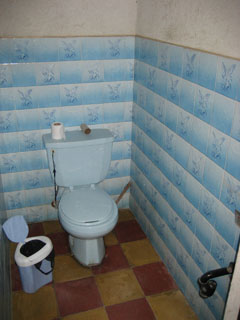
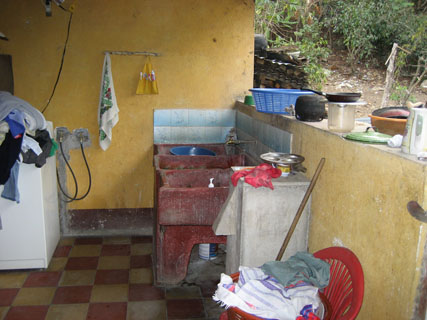
Next we have the kitchen/ dining room. Cooking is done here on a gas stove, which is somewhat of a luxury in these parts. We also have a fridge, which puts us squarely in the upper middle class. The last photo is of my bedroom, complete with wife. I have an old desk to keep my clothes in and do the occasional homework assignment.
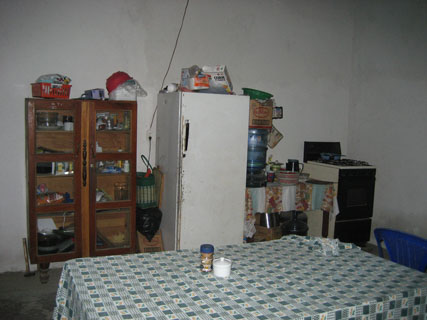
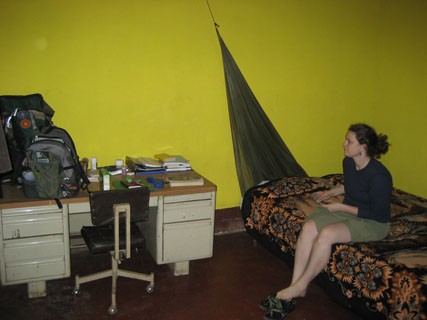
Technical Training
These first three months in Guatemala are for training. When we signed up for Peace Corps, we were originally told we’d be working in the Appropriate Technology department, helping underserved communities develop and build five core technologies to increase the standard of living in rural Guatemalan homes. Project types include:
- Efficient wood stoves, to prevent respiratory diseases suffered by the women cooking over open fires in the home (as well as reduce the ongoing deforestation)
- Concrete floors, to reduce the incidence of hookworm and fecally transmitted diseases from dirt floors.
- Sanitary latrines, to prevent the spread of fecally transmitted diseases.
- Enclosed wells, to reduce waterborne diseases and encourage handwashing and other sanitary habits.
- Waste sumps, to reduce contamination of water supplies.
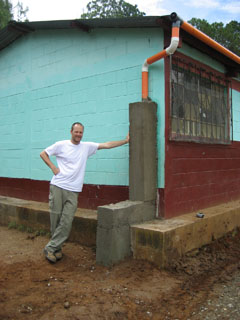 These five critical technologies sound pretty basic to you and me, but are targeted by the Peace Corps, World Health Organization, and other aid agencies as being critical, effective, and reasonably attainable with the means at hand. However, in the last few months, the focus of the program has changed. After testing a pilot program in Africa, it became apparent that much greater increases in family health can be realized for a tenth of the money by refocusing the program. Now, instead of doing 80% construction and 20% health lectures, we’re going to be doing 10% construction and 90% health education. I am pretty demoralized about this. I realized the practicality of this, as far as helping the people more effectively, but on a personal level, this is really disappointing. The silver lining is that once we get through training and sent to our sites, we will have the opportunity to develop our own projects, on our own initiatives. I also spoke with the head of the program, and it’s his intention to start a major building program in the second year of our service, after we run the health-awareness program for the first year. So, i guess we will see what happens. Last week we traveled to the highlands and spent a week doing hands-on construction work, and I will write more about that in the next letter.
These five critical technologies sound pretty basic to you and me, but are targeted by the Peace Corps, World Health Organization, and other aid agencies as being critical, effective, and reasonably attainable with the means at hand. However, in the last few months, the focus of the program has changed. After testing a pilot program in Africa, it became apparent that much greater increases in family health can be realized for a tenth of the money by refocusing the program. Now, instead of doing 80% construction and 20% health lectures, we’re going to be doing 10% construction and 90% health education. I am pretty demoralized about this. I realized the practicality of this, as far as helping the people more effectively, but on a personal level, this is really disappointing. The silver lining is that once we get through training and sent to our sites, we will have the opportunity to develop our own projects, on our own initiatives. I also spoke with the head of the program, and it’s his intention to start a major building program in the second year of our service, after we run the health-awareness program for the first year. So, i guess we will see what happens. Last week we traveled to the highlands and spent a week doing hands-on construction work, and I will write more about that in the next letter.
In addition to the health training, we’re having ongoing training in safety, personal health, culture, local politics, and other such things.
Language Training
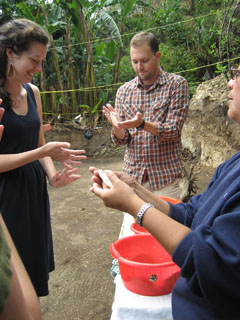 We are also in the midst of intensive language and cultural training. Volunteers are required to have 2 years of college Spanish to even be allowed into the Guatemala program, but the level of volunteers varies greatly when they arrive. We were all tested, and grouped by level; I started in “Medio-alto”, the third highest of the four groups. Thanks, Robin and Tony, you saved my life. In addition to living with native host families that don’t speak English, we have Spanish lessons for several hours every day. Each group of 4 students gets their own instructor… i can’t think of a faster, more thorough way to learn a language. We also learn about history, customs, politics, and stuff like that. It’s been a little over a month, and I can pretty easily do business deals in restaurants. Discussing politics and philosophy is also possible, but it’s trickier and takes more patience. We’re told that after three months, almost all volunteers are fluent. That is encouraging. We just had a mid-service evaluation, and the instructor told me I am now “advanced”, which basically means that I can do most linguistic tasks, but still need to work on tricky things like subjunctive and the subtleties of imperfect vs. preterite, and that I don’t need a “sympathetic listener” to communicate. To be classed as “superior”, I need to stop making what they call “pattern mistakes”, or regularly occurring errors. I constantly misuse por and para, for example. Just takes time, i guess.
We are also in the midst of intensive language and cultural training. Volunteers are required to have 2 years of college Spanish to even be allowed into the Guatemala program, but the level of volunteers varies greatly when they arrive. We were all tested, and grouped by level; I started in “Medio-alto”, the third highest of the four groups. Thanks, Robin and Tony, you saved my life. In addition to living with native host families that don’t speak English, we have Spanish lessons for several hours every day. Each group of 4 students gets their own instructor… i can’t think of a faster, more thorough way to learn a language. We also learn about history, customs, politics, and stuff like that. It’s been a little over a month, and I can pretty easily do business deals in restaurants. Discussing politics and philosophy is also possible, but it’s trickier and takes more patience. We’re told that after three months, almost all volunteers are fluent. That is encouraging. We just had a mid-service evaluation, and the instructor told me I am now “advanced”, which basically means that I can do most linguistic tasks, but still need to work on tricky things like subjunctive and the subtleties of imperfect vs. preterite, and that I don’t need a “sympathetic listener” to communicate. To be classed as “superior”, I need to stop making what they call “pattern mistakes”, or regularly occurring errors. I constantly misuse por and para, for example. Just takes time, i guess.
The three other students in my village/ class are Anne, Emily, and Joe. Here’s a picture of Emily & Joe, learning how to make a traditional dish in one of our classes. The locals have a hell of a time pronouncing our names, so we’ve all taken Spanish-ized versions. Now we’re José, Emile, Anna, and Jaime (me). Here’s another picture of us in the hills above our town, hiking with one of the language instructors.
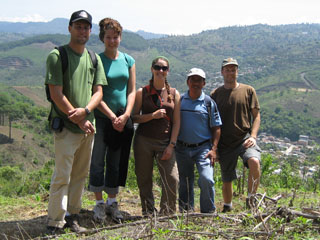
Issues in International Aid
We talk a lot in Peace Corps about why we’re here, and strategies to make thing better. One important idea is “capacity building”, the idea that we want to help the locals to realize their own potential to help themselves. This is good economically and emotionally, but also makes it so they can do the job themselves once we are gone. This is harder than it sounds, because it involves changing people’s attitudes about themselves and their situation, which is tricky. Its not just about education.
Among other things, I learned a few interesting trends regarding a person’s economic status:
| Poor | Middle Class | Wealthy | |
| Food choices | You want the most for your money | You select food based in what tastes the best (or is healthier, in some instances) | You select food based on appearance (check out the aesthetic in any expensive French restaurant, or a sushi bar) |
| Cultural perspective | You care about what happens in your community, local gossip, mayorial elections | You are concerned about national matters: national sports leagues, interstate business, federal lawmaking, presidential elections | You develop an international outlook: watch the BBC, are concerned about global environmental issues, can discuss and possibly visit other countries |
This issue with cultural perspective became apparent last week when we were meeting with a volunteer in the highlands. He mentioned that in last year’s national election, most of the people of his village voted for Rios Montt. Apparently, during the election, Montt came by and made a speech and gave everyone a few dollars. This was very popular amongst the people, and they appreciated the good he did on a local level. However, this village has only poor inhabitants, and they were unaware of the national perspective. They didn’t realize that when Montt was the president of Guatemala in the 80’s, he we responsible for the disappearance, torture, and death of several thousand native Mayans… even people from this very town, whose bodies were discovered in a mass grave three years ago when they were installing a cell phone tower at the edge of town. Their lack of national perspective could very well have cost them dearly (luckily, Montt was defeated. An international council is still trying to get him tried for war crimes, which is tricky, because he DID somehow get a seat in the Senate).
Weirdness and more culinary oddities
This is where I write about the general weird stuff i come across- you know, the stuff everyone really wants to hear about. We’ll start with food, a favorite topic. I was eating dinner the other day when Memo came running in, excited because the zampopos just appeared. What are they, you ask? Giant ants, about the size of wasps. One day every year, a batch of them comes to the surface with wings, and they fly around everywhere, spreading their colony to parts unknown (kindof like the 17-year cicadas). About 99% of them just get tired, though, and by the end of the day kids are running around collecting them in big bags. Why? To fry up and eat like popcorn, of course! Here’s a picture of Memo with one of his prizes.
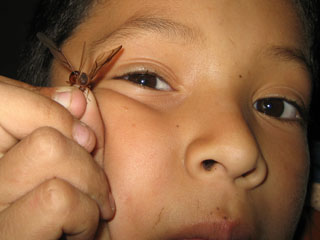

There are also many weird fruits available here. We ate this thing the other day- once you peel of the bit that looks like a sea urchin or amoeba, the inside is much like a giant peeled grape. I can’t for the life of me remember what the name of this oddity is, but Emily says it’s a lychee.
Many other strange things are related to transportation. If you want to get a bus somewhere in the main cities, they have “bus terminals” like this. Basically, some busses show up, and the assistant stand in the door and yells the name of a town over and over. If your destination is in the same direction as that town, you get on. When the driver feels like there’s enough people on board, off you go.
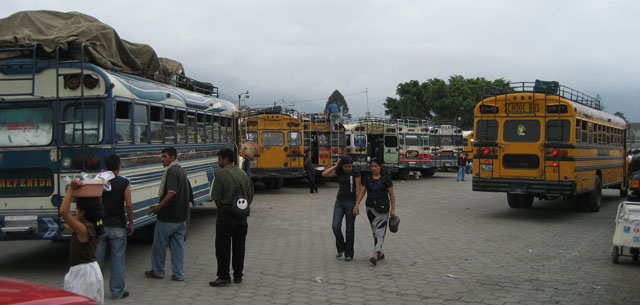
Now, if you’re a kid, you might just want to pretend you are driving a car. That’s why they have playgrounds like these, cleverly disguised as auto salvage lots:
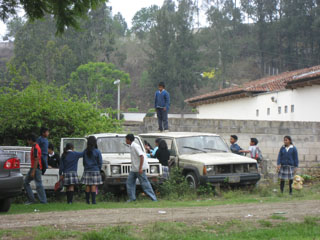
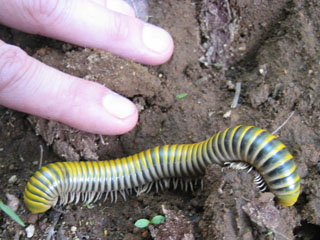
And I’d be remiss in my duties if I didn’t include at lease one picture of some sort of gross bug, so this last picture is a little something I came across while hiking.
(back to top)
So, that is about all I have for this edition. I really wanted to spend some time talking about Field Based Training last week, but this is getting to be an enormous monster letter and I am afraid I will bore everyone to tears. So, look for a second post in June. It will be a lot of photos and discussion about construction-related issues, so all of my contractor/ architect buddies will probably like it, but it might be pure painful for everyone else.
If there is something anyone wants me to talk more about, or you have any other comments, please send me an email and let me know. Also, if it takes me a while to get back to you, it means that I had a hard time getting internet access this week (or two); it doesn’t mean that the spark is gone from our relationship.
Be careful out there.